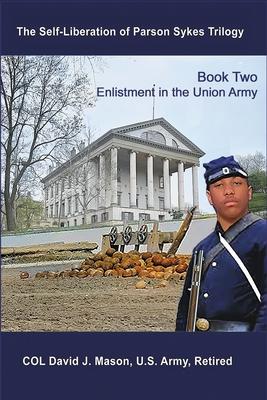The Self-Liberation of Parson Sykes: Enlistment in the Union Army by David J. Mason is a riveting historical fiction novel that places its protagonist at the heart of the Civil War's most challenging and transformative moments. At only seventeen, Parson Sykes is an African-American youth navigating from the oppressive "contraband of war" status to becoming a soldier in the United States Colored Troops (USCT) as a member of the XXV Army Corps. It's important to note that although The Self-Liberation of Parson Sykes is historical fiction, David J. Mason delivers an emotionally compelling story of his great-grandfather, Parson Sykes's journey toward freedom, giving readers a deeper understanding of the complex challenges that Black soldiers faced.
The Enlistment in the Union Army is the second novel in the Self-Liberation of Parson Sykes trilogy. It cites the historical political events that abetted Parson's self-liberation in a compelling narrative format, ensuring the readers understand the accuracy and reliability of the information presented. This novel profiles Parson's ordeal to earn freedom from a contraband of war status, and into a soldier of the USCT.
In book two, Parson narrates how he overcame his inner fear of defeat in self-liberation ordeal and rebounded from his struggles. As a formerly enslaved Union Army volunteer during the war, he endured racially motivated dangers, causing him to behave much differently than a conscripted Confederate soldier.
During his military service, Parson met several mentors and advisers who helped him enhance his resourcefulness in solving social, political, and economic demons by creating novel solutions to overcoming them. When the XXV Corps received orders to attack the Confederates' fortified lines, Parson embraced the mission as a challenge for freedom and self-liberation. Parson learned the transition from contraband into a freed was difficult, and he would need financial, political, and humanitarian assistance to fulfill his self-liberation journey in the future. Parson realized transforming contraband to freed person needed action from the government, but equal treatment was slow in coming and attenuating racism.
The author writes with realism and careful attention to detail. Mason's thorough research into this profound era is deeply respected and will not go unnoticed. He quoted major historical events accurately, which is an indication the book was well-researched and can be used as a stepping stone for further reading. This thought-provoking work also shows the critical role played by black soldiers in turning the tide in the Union's favor and the impacts of war not just on the military but also on civilian personnel
